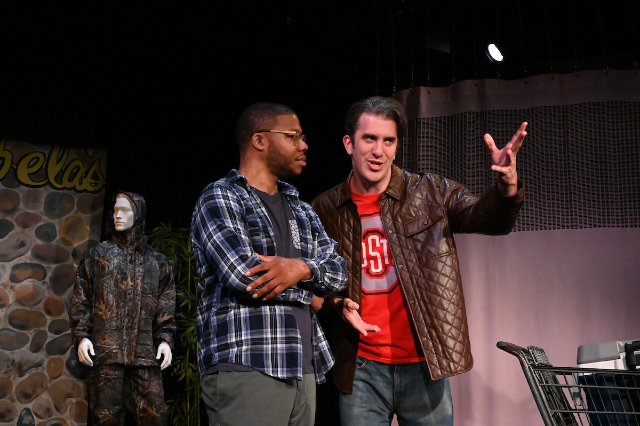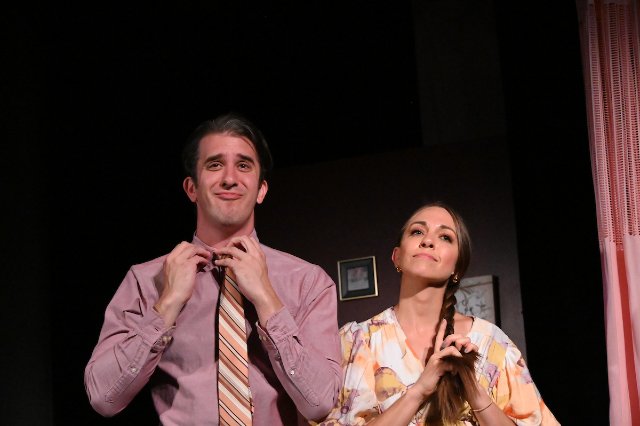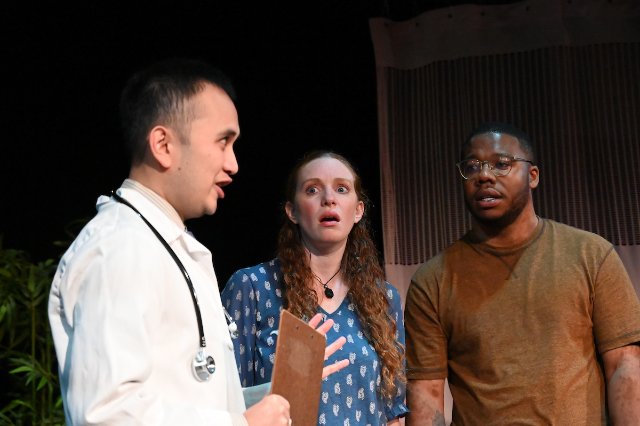Human Error
Town Hall's Humorous Look at IVF, Medical Error, and Politics of Division
By: Victor Cordell - Sep 01, 2024
Author Eric Pfeffinger’s metaphor posits that America’s political opposites live on different sides of a vast canyon, interacting only by accident. Their beliefs and even perception of facts differ. Extending the analogy, the red tribe believes the blue to be dangerous parasites preying on the accomplishments of the rich, and the blue tribe believes the red to be impoverishing, self-indulgents preying on the undercompensated vital inputs from workers. Identity politics and identity religious beliefs exacerbate the gulf and impede gradations of viewpoints from arising.
In the playwright’s brutally thoughtful comedy “Human Error,” prototypical couples of each political persuasion are brought together through an accident in which the saved embryo of the liberal pair is implanted in the wife of the conservative pair. Forced to deal with this existential catastrophe, the two couples try to build a relationship. Town Hall’s production captivates from curtain up to curtain down with razor-sharp acting and staging enhancements that make for a richly entertaining experience.
Theater going is dominated by audiences with a liberal bent, but Pfeffinger is smart enough to know that simply making the conservative pair punching bags for liberal tropes wouldn’t make for good theater. Yet that is how the narrative begins. Even when the conservative woman bearing the unintended embryo says to the other couple, “I’m doing this for you,” the liberal-minded onlooker has to wonder what’s up. Is the carrier duping the owners of the embryo into believing that the baby will be delivered to them upon birth, or does she really mean that she is bringing it into the world for them, but that she is going to keep it? Trust from one couple to the other is nowhere to be found.
Flannery Mays captures the anti-religious, disillusioned, and unsympathetic yoga teacher Madelyn. We want to relate to her and like her as we respect her values. But she is uncommonly aggressive, uncompromising, and rude. Perhaps the moment when we want to banish her from our club is when she reveals that she doesn’t want having a baby to affect her lifestyle. “I want to have a kid, but I don’t want to be a mother.”
From the start, we don’t like Heather, played with exacting and convincing glibness by Melody Payne. She seems a housework-loving cipher, with a shallow, simplistic view of the world, but with three sons, she does know a thing or two about raising children.
Unlike Madelyn’s unvarnished candor, however, the playwright endows conservative Christian Heather with sneaky introspection and complexity. Her zenith is when she foists Madelyn on her own petard. Late in the pregnancy, Madelyn is furious to learn that Heather is pro-life, but DUH!!! Madelyn attributes Heather’s carrying the fetus to term to political beliefs that Madelyn can’t abide. But Heather cleverly traps Madelyn into an argument in which the latter’s position concerning the pregnancy is not driven by pro-choice “it’s my body” integrity, but concerns of property ownership.
The one character that is a cardboard cutout is Heather’s husband Jim, portrayed with unrelenting bumptiousness and self-centeredness by Kyle Goldman. A crass, classless, NRA-card-carrying small business owner, he’s an exemplar of just the type of guy that a liberal man would not want to be around. And his identity characterization extends to being a rabid Ohio State fan, even though he never went to the school. Though he identifies with the religious convictions of his community, he doesn’t seem to really share them, as regular church attendance doesn’t play a role in his life.
Jim is the insistent type that wants others to want the same things that he does, and he’s constantly bugging Keenan, Madelyn’s husband, to see his rifle collection, appreciate his massive home entertainment system, and such. Of course, Keenan is the cerebral type with no interest in such things, and Mark Anthony fills his shoes well. Fittingly, he is an academic researcher on humor in entertainment, and his primary thesis concerns the effect that humor has on dividing societies, a compelling thought that most of us probably have not considered.
So where does this all go? Humorous and conflictual incidents amass. Positions of parties shift. And curious and unanticipated turns take place with the pregnancy. The constant is the bumbling Dr. Hoskins, whose lab is responsible for the mix-up. The character is acted with appropriate antic humility and stuttering, plus evasive and nervous-smiling apprehension by John Charles Quimpo.
Director Richard Perez pushes all the right buttons, supported by creative designers like Adrian Gilstrap for lighting and Michael Kelly for sound. The play and production succeed in finding great humor and touching moments in a topic of grave importance and questions political and social imperatives. It’s a great combination of thought provoking and fun.
“Human Error,” written by Eric Pfeffinger is produced by Town Hall Theatre Company and plays on its stage at 3535 School Street, Lafayette, CA through September 14, 2024.






